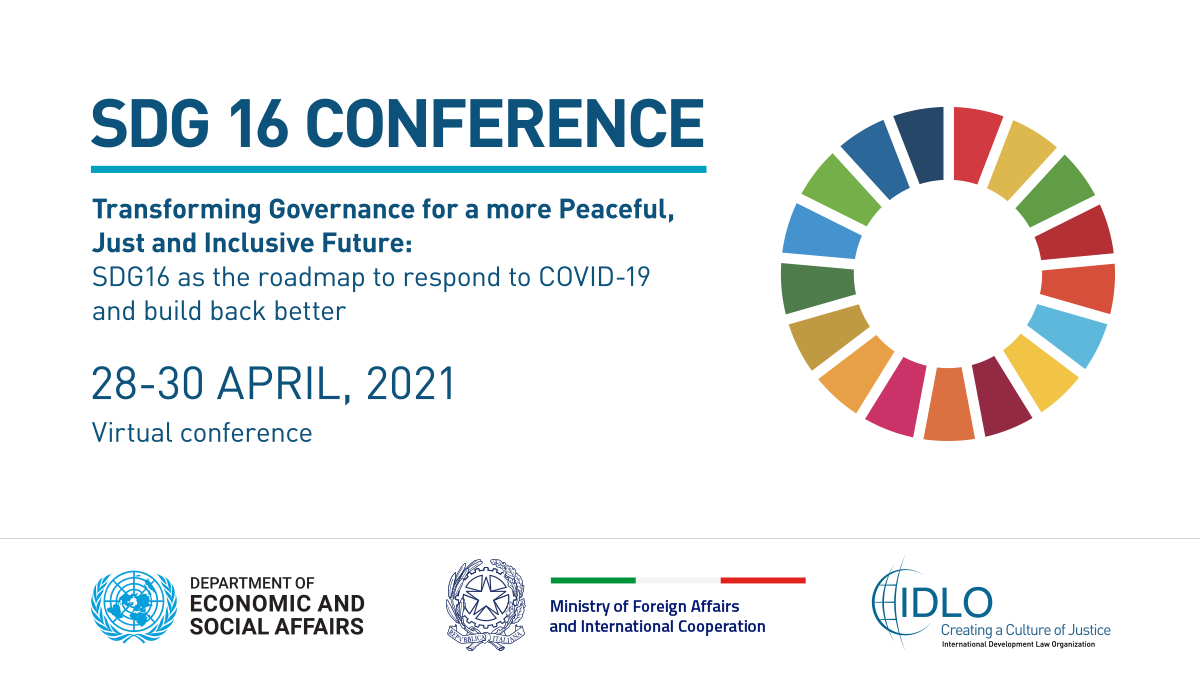Priority Action 8: Promote a renewed spirit of multilateralism in alignment with the SDGs
Effectively addressing pressing global challenges requires international cooperation, support, and solidarity. The SDGs incorporate a strong emphasis on the rule of law and human rights and provide a universally accepted framework to foster global collaboration, including technical assistance, exchanges of information, and good practices. Agenda 2030 can help promote renewed multilateralism and a framework for the international community to work collectively to tackle shared challenges, build resilience to common threats, and achieve global goals towards peace and development. The principles of equity, equality and non-discrimination, and the focus on the rule of law, good governance, and effective institutions, are at the core of SDG 16, and cut across the entire Agenda.
The COVID-19 pandemic has brought justice systems’ resilience into sharp focus and highlighted how poor governance is a threat to the delivery of all dimensions across the 2030 Agenda. Weak trust in institutions and rising levels of inequality have been underlined as core factors which undermine the ability to overcome challenges faced as a result of the pandemic, and efforts to bring about social and economic recovery and the advancement of sustainability in the years to come. Governments, citizens, the private sector, and civil society need to come together to build understanding of the rights of individuals and the obligations of others, and to ensure appropriate accountability for action on commitments made.
In this regard, the SDG 16+ community have called leaders to review SDG 16 at every HLPF with the understanding that:
An annual thematic review of SDG 16 at each HLPF will help ensure that Member States and the international community retain focus on issues that serve as critical enablers of progress towards all SDGs. Maintaining this focus on SDG 16 will provide a critical platform for exploring solutions-oriented approaches to achieving the entire 2030 Agenda – particularly with the focus on “building back better” from the COVID-19 pandemic.
The COVID-19 pandemic has illustrated that the acceleration of SDG 16 is required now more than ever. A multi-lateral and multi-stakeholder recovery should be grounded in rule of law-based policymaking.
HIGHLIGHTS
Global partnerships for bold new action – the SDG 16 Conference as the multi-lateral and multi-stakeholder platform

The first SDG 16 Conference was held in 2019, on the occasion of the SDG 16 periodic review by the UN Economic and Social Council (ECOSOC). In partnership with the United Nations Department of Economic and Social Affairs (UNDESA) and the Government of Italy, IDLO co-convened the SDG 16 preparatory conference in Rome, bringing together stakeholders from the international community, government, judiciary and civil society to assess progress and challenges in achieving SDG 16.
Recognizing the importance of civil society in advocating for SDG 16 at the local and global levels, IDLO also sponsored a Civil Society Day conference on the sidelines of the main conference, co-hosted with the New York-based TAP network of SDG 16+-focused civil society organizations. The CSO conference resulted in the Rome Declaration, which was presented to the HLPF in July 2019 in New York.
Building on the outcomes of the first conference in 2019, the 2021 Rome Conference will consider the impact of the COVID-19 pandemic on SDG 16 as well as the transformative contribution SDG 16 can make in helping to safeguard and accelerate progress on the 2030 Agenda for Sustainable Development. It will highlight the importance of policy orientations embodied in SDG 16 to efforts to build resilience to shocks and provide a roadmap for a more just, equitable and inclusive recovery required to sustain peace and development and deliver on the Decade of Action to the deliver the Global Goals.
Find out more:
Advancing climate justice through SDG 16

Building back better from the COVID-19 pandemic requires a concerted multilateral commitment to promoting greener, more sustainable, just and inclusive societies through the rule of law.
The devastating consequences of climate change on the environment and biodiversity impact societies around the world. The poorest and most vulnerable in society are hardest hit and lower-income countries and fragile states are less able to adapt to increasing climate induced threats.
Biodiversity loss adversely affects food systems and the health of populations. Competition over increasingly scarce land and resources undermines peace and security, and drive conflict and migration. Existing gender inequalities are exacerbated, and indigenous livelihoods are threatened.
IDLO’s key contribution to addressing the impact of climate change is its rights-based, rule of law approach to climate adaptation in programs, research and policy advocacy in order to enhance access to justice, reduce fragility, and promote peace and security.
The rule of law is essential to safeguard against the worst effects of climate change and loss of biodiversity. IDLO’s Climate Justice program empowers vulnerable populations to claim their environmental rights and more actively participate in decision-making processes; promotes climate-resilient development and adaptation through strengthening of regulatory frameworks and institutional capacity particularly in fragile and developing contexts; and increases access of climate vulnerable groups, especially women and girls, to customary and non-customary rights to land and other natural resources, promoting sustainable peace and security.
Find out more:

